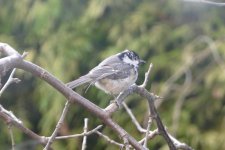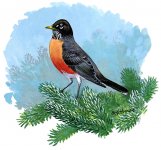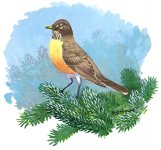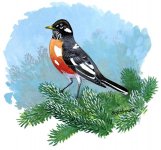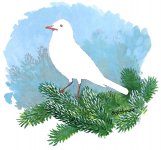-
Welcome to BirdForum, the internet's largest birding community with thousands of members from all over the world. The forums are dedicated to wild birds, birding, binoculars and equipment and all that goes with it.
Please register for an account to take part in the discussions in the forum, post your pictures in the gallery and more.
You are using an out of date browser. It may not display this or other websites correctly.
You should upgrade or use an alternative browser.
You should upgrade or use an alternative browser.
Is this a juvenile coal tit? (1 Viewer)
- Thread starter NearlyNoviceBirder
- Start date
More options
Who Replied?MTem
Well-known member
It is not a juvenile plumage effect, although if the photo was taken recently then it will have moulted into its adult plumage by now anyway. The salt and pepper effect looks to be a mixture of mixed up head feathers after a bath, light reflecting from behind on fluffed up feathers, and some pigment loss in some of the head feathers as well.
He/she doesn't look in the best of health either....
He/she doesn't look in the best of health either....
NearlyNoviceBirder
Well-known member
Thanks. Photo was taken yesterday (28/01) in the garden, we don't get many of them visiting. I will see if I can see it again.
Nutcracker
Stop Brexit!
Looks like a leucistic / partial albino Coal Tit to me.
Looks like a leucistic / partial albino Coal Tit to me.
Agree on leucistic Coal Tit.
Do notice that "partial albino" makes as little sense as "she was slightly pregnant"3
Best regards Peter
NearlyNoviceBirder
Well-known member
Thankyou.
Nutcracker
Stop Brexit!
I'm aware there are some factions around that are attempting to ban the use of the term 'partial albino', but it just means 'partly white' as opposed to the traditional meaning of leucistic, which means uniformly pale (not pure white) all over.Agree on leucistic Coal Tit.
Do notice that "partial albino" makes as little sense as "she was slightly pregnant"3
Best regards Peter
It's a bit like those who state that steam is invisible, but if you ask the Anglo-saxons who invented the word, it means the visible cloud of condensed water, not the invisible water vapour which they couldn't know about :t:
I'm aware there are some factions around that are attempting to ban the use of the term 'partial albino', but it just means 'partly white' as opposed to the traditional meaning of leucistic, which means uniformly pale (not pure white) all over.
It's a bit like those who state that steam is invisible, but if you ask the Anglo-saxons who invented the word, it means the visible cloud of condensed water, not the invisible water vapour which they couldn't know about :t:
Albino is a condition (lacking all pigment) just as pregnancy (having an embryo in the womb) is a condition, and it thus just doesn't make more sense to describe a partly white bird as being "partial albino" than it does does to describe a woman in, say, fourth month of pregnancy as "partial pregnant"
Nutcracker
Stop Brexit!
But if something is lacking all pigment in just part of its body, then partial albinism is applicable 
Numerous sources still use this definition :t:
Numerous sources still use this definition :t:
But if something is lacking all pigment in just part of its body, then partial albinism is applicable
Numerous sources still use this definition :t:
Indeed, but you wrote partial ALBINO and that is just not possible|8)|
Is there a difference between albino and albinism? If not both partial albino and partial albinism would be """incorrect""".
Easier just to say leucistic for these not albinos. It's only one word.
Agree, it is incorrect to name any living creature with any pigment as albino so let's just stick to the broad, correct and easily understood term "leucistic" for these abberant critters:t:
Nutcracker
Stop Brexit!
Because there's two different types of plumage variant involved, and it makes excellent sense to have different names for them:Is there a difference between albino and albinism? If not both partial albino and partial albinism would be """incorrect""".
Easier just to say leucistic for these not albinos. It's only one word.
Pic 1 - normal
Pic 2 - leucistic
Pic 3 - partial albino
Pic 4 - full albino
(photoshopped from USFWS pic)
Attachments
super-silly-um
Well-known member
Because there's two different types of plumage variant involved, and it makes excellent sense to have different names for them:
Pic 1 - normal
Pic 2 - leucistic
Pic 3 - partial albino
Pic 4 - full albino
(photoshopped from USFWS pic)
I believe there is contention over the definition of albinism, but I would say that 3 is partially leucistic.
Richard.
Tiraya
San Diego CA

I believe there is contention over the definition of albinism, but I would say that 3 is partially leucistic.
Richard.
As would I.
Image 2 is the far less typical "leucism" variety. 2 is probably better called schizochroistic rather than leucistic. This means that the plumage is lacking pigment in general rather than the complete white areas often associated with leucism.
Of course, any lack of pigment with the exception of total (albinism) can "correctly" be called leucism. There are just different words thrown around here and there

.... let's just stick to the broad, correct and easily understood term
I think for the average person in the street, the term 'partial albino' is going to more more easily understood than 'partially leucistic'.
Try it on your non-birding neighbour who asks about the odd coloured bird in their garden - 'Oh it's just a usual crow, but suffering from partial leucism'. Would half expect them to either roll their eyes or be on the phone calling the RSPCA to ask them to come and get the bird with this exotic disease
Tiraya
San Diego CA

I think for the average person in the street, the term 'partial albino' is going to more more easily understood than 'partially leucistic'.
Try it on your non-birding neighbour who asks about the odd coloured bird in their garden - 'Oh it's just a usual crow, but suffering from partial leucism'. Would half expect them to either roll their eyes or be on the phone calling the RSPCA to ask them to come and get the bird with this exotic disease
Too be quite fair, there isn't much that is complicated about "leucism: means there is some colour loss"
Still, I can easily see the above scenario occurring. Ah well, we'll live.
skatebirder
Well-known member
How about: "It's got a bit of white on it?" 
David
David
Tiraya
San Diego CA

How about: "It's got a bit of white on it?"
David
That is very close to what I originally typed but that doesn't work for the ones where the colours are just muted slightly.
NearlyNoviceBirder
Well-known member
All very interesting  My travels around the internet in search of the meaning of leucistic took me here:
My travels around the internet in search of the meaning of leucistic took me here:
http://www.surveymonkey.com/s/plumagesurvey
so if anyone else has one in their garden these guys want to know. It seems that coal tits with funny feathers are relatively uncommon compared to others
(hope it is ok to post links)
http://www.surveymonkey.com/s/plumagesurvey
so if anyone else has one in their garden these guys want to know. It seems that coal tits with funny feathers are relatively uncommon compared to others
(hope it is ok to post links)
Similar threads
- Replies
- 12
- Views
- 1K
Users who are viewing this thread
Total: 2 (members: 0, guests: 2)




